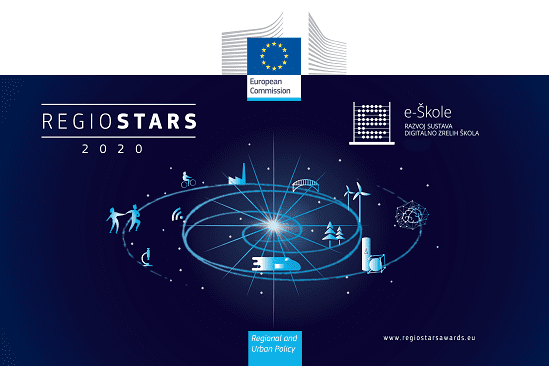The event took place last night in Brussels, during the #EURegionsWeek 2020, celebrating outstanding Cohesion Policy projects from all over Europe, with Croatia’s e-Schools project taking the prize for the best project in the inclusive growth category
RegioStars awards are organized each year by the European Commission, during the European Week of Regions and Cities in order to promote excellence and new approaches in EU-funded projects in the field of regional development. The event focuses on five areas that are crucial for the future of the EU regional policy. Last night, at the awards ceremony, e-Schools project from Croatia was awarded as the best project in the Inclusive Growth – Skills & Education for a Digital Europe category, proving the importance of a comprehensive approach to implementing modern technology, digital contents and support that enables every student to have an equal chance for education, regardless of where they are.
“We are truly honored and happy to receive the award for e-Schools pilot project. It is really a sum of many and everyone at CARNET are beyond proud of taking part in the advancement of education across all schools in Croatia” said Andrijana Prskalo Maček, e-Schools project leader. “The project is ongoing, and we are convinced that until the end of 2022, we will digitally transform the teaching and educational processes in all schools. In this way, we will contribute to the strengthening of digital competencies of teachers, and then indirectly of students as well, in order to prepare them for the 21st century labour market, further education and lifelong learning”.
e-Schools project was first launched in 2015 by CARNET with the goal to increase the level of digital maturity for 10 percent of primary and secondary schools in Croatia. In digitally mature schools, teachers use technology to improve teaching, develop their own digital content and provide support for independent learning and the development of critical skills in students who are at the heart of the teaching process. Students actively participate in teaching with increased motivation to learn and continue their education, and thus become more competitive in the labour market. The management of e-Schools is efficient and transparent, and communication and exchange of e-documents between the school, its stakeholders and founders is much simpler.
In the second phase of the programme, by the end of 2022, all schools will be equipped with wireless local area networks and the corresponding active network equipment. Following the network, selected classrooms in each school will be equipped with modern ICT devices for teaching and teacher will receive a device to help them prepare and implement modern educational practices in their classrooms. Having this in mind, the crucial part of the e-Schools programme is the support and training of the teachers and the school staff. Also, to further facilitate and encourage the usage of the ICT, suitable digital educational content and other e-content and e-services are being developed. Furthermore, activities dealing with security aspects of the ICT implementation will also be implemented.
“The success of the pilot project where we covered 10 percent of schools pushed us forward and provided the necessary experience which enabled us for the second phase of the project, ensuring that the other 90 percent of the schools catch up even faster and achieve high level of digital maturity”, said Goran Kezunović, CEO of the Croatian Academic and Research Network – CARNET. “Providing schools and teachers with not only infrastructure, but also digital platforms, content, education and support to school staff, we have contributed considerably to the rapid transformation from classroom to distance learning, and that proved essential during the recent extraordinary circumstances caused by the coronavirus pandemic”.



